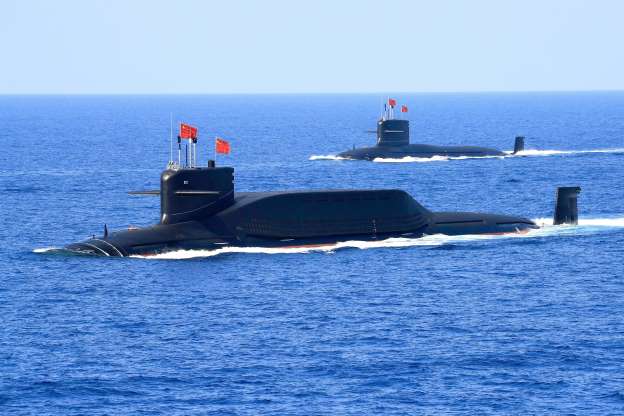Media Report

- Reuters reports, "Recent visitors to the bay surrounding a submarine base on the southern coast of China's Hainan Island describe a curious nocturnal phenomenon. Powerful spotlights are sometimes trained directly on the ocean frontages of neighboring hotels at night, making visibility out to sea virtually impossible. Some of the lights are mounted on land and others on passing naval patrol boats. 'The effect is incredible,' said one recent visitor. 'The glare is so great you can hardly stand it on the balcony. You go inside and draw the curtains tight.' The blinding lights cannot obscure something of intense interest to the world's military intelligence agencies: evidence that China has made a breakthrough in its drive to rival America and Russia as a nuclear arms power."...After six decades of battling to master complex and challenging subsea military technologies, China has joined the United States, Russia, the United Kingdom and France in the nuclear ballistic missile submarine club. In its most explicit assessment so far of this Chinese capability, the Pentagon in its latest annual report on China's military, published in August, said that Beijing now has a "credible" and "viable" sea-based nuclear deterrent.
- CNBC reports, "The announcement of a U.S. trade deal with China is "possible" by next Friday, sources told CNBC on Wednesday. A U.S. delegation met with Chinese negotiators in Beijing on Wednesday as the world's two largest economies try to hammer out details of an agreement. Chinese Vice Premier Liu He will travel to Washington for talks next week.Washington and Beijing have pushed to resolve a trade dispute that led to a series of tariffs and raised fears about spiraling economic damage. While both sides have repeatedly touted progress in the talks, disputes such as whether to immediately remove existing tariffs or keep them in place as an enforcement measure to stop practices such as intellectual property theft have derailed a final deal. President Donald Trump also wants China to buy more U.S. goods to reduce the trade deficit between the countries. On Wednesday, the White House said the latest talks moved Washington and Beijing closer to an agreement."
- The Washington Post reports, "Gavin Williamson was just fired as Britain's defense secretary after being accused of leaking information. Last week, Britain's National Security Council decided that Chinese telecommunications giant Huawei Technologies would be allowed to play a limited role in building Britain's 5G telecommunications network. Someone leaked this information to a British newspaper. According to the BBC, British Prime Minister Theresa May told Williamson that she had 'compelling evidence' that he was responsible for the leak. Williamson has denied that he was the leaker. This crisis in British politics reflects a broader set of global security problems: Telecommunications networks, which sound boring and technical, have become a major security issue. The leak was highly embarrassing to the British government because it revealed how controversial the Huawei decision was within the government."
Calendar
- 2019-05-01 China, U.S. hold 'productive' trade talks in Beijing
- 2019-04-29 U.S.-China Talks to Resume With Significant Issues Unresolved
- 2019-04-28 US warns China on aggressive acts by fishing boats and coast guard
- 2019-04-26 Trump Says Xi Jinping of China Will Visit Soon, Stirring Anticipation of a Completed Trade Deal
- 2019-04-25 China says French ship entered its waters illegally
- 2019-04-24 U.S. charges American engineer, Chinese businessman with stealing GE’s trade secrets
- 2019-04-23 China's Belt and Road Cracks Down on Corruption in Image Revamp
- 2019-04-22 Western AI researchers partnered with Chinese surveillance firm
- 2019-04-18 U.S. wins WTO ruling against China grain import quotas
- 2019-04-17 China says its first-quarter GDP grew by 6.4 percent, topping expectations
News
- CNBC A US-China trade deal is 'possible' by next Friday, sources say
- The Washington Post Britain's defense secretary was just fired over Huawei. Here's what's going on.
- Reuters China's furtive underwater nukes test the Pentagon
- The Washington Post 'Police cloud': Chinese database tracks apps, car location and even electricity usage in Muslim region
- CNN Six Marxist students vanish in China in the lead up to Labor Day
- Bloomberg Taiwan President-Hopeful Terry Gou Talks With Trump
- CNN How the Trump administration won a major policy shift from the Chinese on fentanyl
- Politico U.S., China near deal to roll back some tariffs
- Reuters China blocks imports from two Canadian pork producers amid diplomatic spat
- Bloomberg China's Mass Surveillance More Sophisticated Than Thought
- The Diplomat Xi Repeatedly Urges China's Youth to Follow the CCP
- Bloomberg China Pledged to Give Foreign Financial Firms More Access. How's That Going?
- Reuters U.S. legislation aims to thwart China's electric-vehicle dominance
- Bloomberg China Is a Dying European Shipbuilder's Last Hope
Commentary
- The New York Times Will China Export its Illiberal Innovation?
- Bloomberg The World Shouldn't Save the Belt and Road
- Fortune Trump Could Throw Tech Under the Bus to Get a Trade Deal with China
- The Diplomat May 4, 1919: The Making of Modern China
- The Wall Street Journal One Belt, One Road, and a Lot of Debt
- Forbes No, The China Trade War Has Not Destroyed U.S. Trade